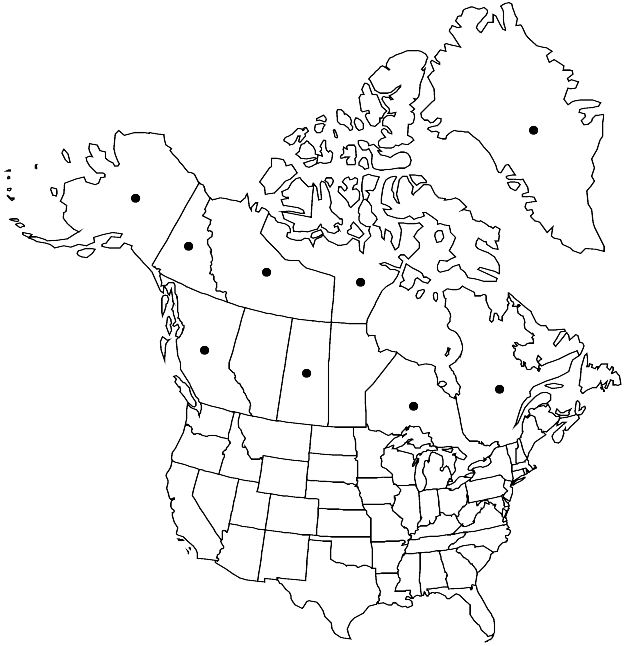Draba cinerea
Mém Soc. Imp. Naturalistes Moscou 5: 103. 1817.
Perennials; (cespitose); caudex simple or branched; rarely scapose. Stems unbranched, (0.3–)0.5–1.6(–2.7) dm, pubescent throughout, trichomes 4–10-rayed, 0.1–0.3 mm, (often some rays branched, simple trichomes sparse, to 0.6 mm). Basal leaves rosulate; petiolate; petiole base and proximalmost margin ciliate, (trichomes simple, 0.2–0.8 mm); blade oblanceolate to narrowly obovate or linear-lanceolate, 0.4–1.5 cm × 1–5 mm, margins usually entire, rarely with 1 tooth on each side, surfaces densely pubescent with minutely stalked, stellate, 8–12-rayed, trichomes 0.1–0.25 mm, (midvein obscure abaxially, apex trichomes simple). Cauline leaves 0–3(–5); sessile; blade ovate or oblong to lanceolate, margins entire, surfaces pubescent as basal. Racemes (3–)5–17(–24)-flowered, ebracteate, elongated in fruit; rachis not flexuous, pubescent as stem. Fruiting pedicels divaricate-ascending or ascending, straight, (3–)4–7(–9) mm, pubescent as stem. Flowers: sepals ovate, 1.7–2.5 mm, pubescent, (trichomes simple and short-stalked, 2- or 3-rayed); petals white, spatulate to obovate, 3.5–4.5 × 1.5–2 mm; anthers ovate, 0.3–0.4 mm. Fruits oblong to elliptic, plane, slightly flattened, 5–8 × 2–3 mm; valves pubescent, trichomes short-stalked, 2–5-rayed, 0.05–0.3 mm, (some rays branched); ovules 20–36(–42) per ovary; style (0.1–)0.2–1 mm. Seeds ovoid, 0.6–0.8 × 0.4–0.6 mm. 2n = 48.
Phenology: Flowering Jun–Jul.
Habitat: Rock outcrops, ridges, meadows, gravel beaches, stream banks, alluvial fans
Elevation: 0-500 m
Distribution

Greenland, B.C., N.W.T., Nunavut, Ont., Que., Sask., Yukon, Alaska, Europe (Finland, Norway, n Russia), e Asia (Russian Far East, Siberia).
Discussion
Draba cinerea is a polymorphic species in which tetraploid, hexaploid, heptaploid, and octoploid chromosome counts (all based on x = 8) have been reported (e.g., R. C. Rollins 1993). Although we have not seen the type collection, we tentatively consider the taxon to be hexaploid, which is the predominant ploidy level throughout the species range, including North America, and also from its type region in Siberia.
Hexaploid Draba cinerea is closely related to decaploid (2n = 80) D. arctica, from which it is distinguished with difficulty. In general, D. cinerea has 1–3(–5)-leaved stems, basal leaf blades usually not terminated with simple trichomes and with obscure midveins abaxially, petals 3.5–4.5 mm, and seeds 0.6–0.8 × 0.4–0.6 mm. By contrast, D. arctica has leafless or 1(–3)-leaved stems, basal leaf blades terminated with simple or 2-rayed trichomes and with midveins distinct abaxially, petals 3.5–6 mm, and seeds (0.8–)0.9–1.1 × (0.6–)0.7–0.8 mm.
Selected References
None.